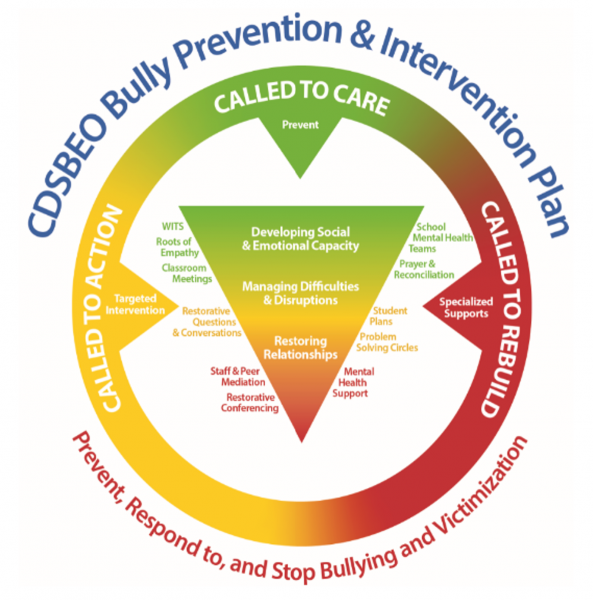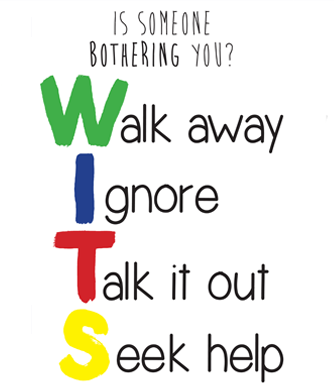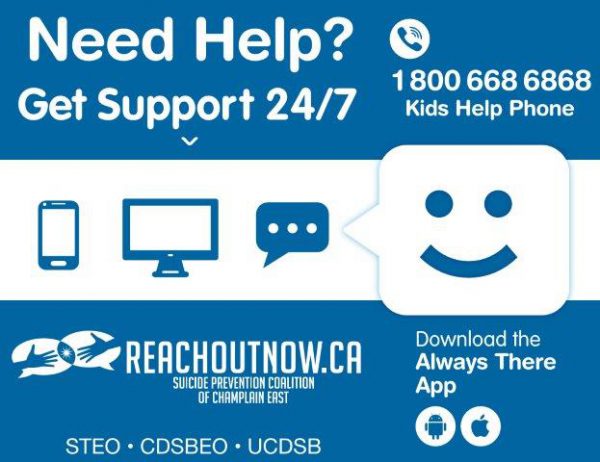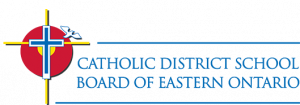Safe Schools
Creating Communities of Peace
We have developed a progressive discipline framework Called to Care… Called to Action … Called to Rebuild. It is our purpose to create safe and caring community schools which respect individuality, celebrate harmony, and strive to promote and develop responsible behaviour based on gospel values and shared discipleship. In response to Safe School legislation, policies and procedures, programs are being implemented in all our schools in consultation with our valued partners.
- A Safe School Resource and Administrative Manual provides resources and best practices.
- Anti-bullying prevention and intervention plans and procedures for tracking and reporting incidents are required.
- Progressive discipline with a continuum of interventions, supports and consequences are used to encourage students to make good choices and address inappropriate behaviour. The approach is corrective and supportive rather than punitive.
- Interventions are applied in consideration of mitigating circumstances and are consistent with the student’s strengths, needs, goals and expectations contained in his/her individual education plan.
- Empathy, social skill and anger management activities and programs are designed to encourage healthy relationships and positive behaviours.
- Training opportunities are provided and students are given leadership opportunities. The Board Catholic Code of Conduct is clearly outlined for staff, parents and community partners.
- All staff will report bullying incidents to the principal and parents, which will be responded to as per the Ministry guidelines.
Rooted in the positive relationships between home, school and parish, we recognize that students need to feel connected, capable and contributing members of our school and faith communities. All staff and students have been trained and are implementing Restorative Practices with a focus on building, maintaining and repairing relationships. Wrong doing and conflict result in harm to people. Classroom meetings and “talking” circles explicitly build positive relationship and enhance school climate. Restorative practices seek to heal and right the wrongs and focuses on the needs of the harmed, those responsible for the harm and the community. By meeting face to face, the restorative process encourages healthy communication, accountability, healing and closure for all.
Community VTRA Protocol: Violence, Threat Risk Assessment
A Collaborative Response to Assessing Potential Violence has been created by both school boards in partnership with Police Services and Community Agencies. The protocol supports collaborative planning and to reduce violence and support safe, caring and restorative approaches within our schools and communities. Specialized training, provided by experts in the field, has allowed key staff members enables the school and community partners assessment team to respond and develop intervention plans.
A revised local police-school board protocol based on the new provincial model has been developed and is being implemented with the different police services across our eight counties.
Specialized Supports and Programs
When serious conflict occurs and student behaviour is deemed unsafe, progressively intensive supports must be employed. Behaviour Crisis Consultants along with Itinerant ABLE Workers support the school teams to help stabilize students and support staff to develop successful programs and plans at the school level. This process includes reviewing and revising the student safety plan or plan for success, modelling different strategies and enlisting support from parents and community partners.
Specialized A.B.L.E. (Alternative Behaviour Learning Environments) programs are provided as alternatives to suspension or long term suspension placements. In this supportive small group setting focused student action plans with academic and behavioural goals are completed and restorative reentry meetings occur when students are ready to return to their community schools.
Turning Points Programs are available for students (grade 7-12) requiring longer term support from mental health agencies who as partners play an important therapeutic role in these classrooms. Mental Health and Addictions Counsellors support in our Turning Points, a partners program, in Smiths Falls, Russell and Cornwall focuses on helping students deal with mental health and addiction issues.
Enhancing Communication and Partnerships
The Special Education Advisory Committee (SEAC) meets monthly to review and discuss the Board’s annual plan, programs and policies. The minutes and agendas are posted on the Board website and a copy of the Annual Plan on the provision of Special Education programs and services is provided to each school for parents and staff review.
The Board continues to be the lead Board responsible for the Student Support Leadership Initiative implemented with our partner agencies and coterminous Board. The Checkered Flags: Everyone’s Responsibility resource document was launched in partnership with various police and community agencies, and sets the protocol for addressing and responding to students in need.
Additional Resources
Creating Communities of Peace Police and School Board Protocol VTRA Fair Notice 2025-2026 Bully Prevention & Intervention Plan Community VTRA Protocol Anti-Sex Trafficking School Board ProtocolBullying Prevention and Intervention Plan

At the Catholic District School Board of Eastern Ontario, we are committed to developing a community that is safe, inclusive and accepting by utilizing our Gospel values and the sacrament of reconciliation. Our Bully Prevention and Intervention Plan is designed to integrate strategies which prevent, respond to, and stop bullying by focusing on developing students’ empathy and understanding. Preventative programming along with targeted intervention, supports students in their call to Care, Act and Rebuild Relationships.
WITS – Walk Away, Ignore, Talk it Out, Seek Help

The WITS Programs bring together schools, families, and communities to create responsive environments that help children deal with bullying and peer victimization. WITS has two components: the WITS Primary Program (Kindergarten – Grade 3) and the WITS LEADS Program (Grades 4 – 6). The WITS acronym stands for Walk away, Ignore, Talk it out and Seek help. The program was created by educators, for educators, with an understanding that effective peer victimization prevention programs should enhance learning environments. The program resources are designed to weave comfortably into the daily life of the learning environment.
What are WITS?
Walk Away!
Just leave the situation you are in. Take a friend with you if you can. Get help if you need it.
Ignore!
Ignore is an action not a passive response. Don’t respond to meanness or teasing. Sometimes it works, if not, seek help!
Talk it out!
This one is tricky! Talk it out can mean a lot of things. It means Speak Up! Use your words! It also means that there is a solution to the problems you are having, but you may have to be brave and go ahead and talk about it. Sometimes it is hard, but using words really is the best way to resolve conflicts!
Seek help!
This is very important. All children deserve to feel safe and that the adults in their lives will help if needed. Keep asking for help from someone new – if the first person you ask doesn’t help you to fix the problem.
The program, which is guided by educators, empowers and teaches students how to implement these strategies. In addition, resources are available to teachers to discuss and address cyberbullying with learners. For more information about the WITS Program, please visit: www.witsprogram.ca
Restorative Practices
Restorative Practices aim to establish an environment where students are empowered to solve problems through authentic conversations using Restorative Proactive Classroom Circles, Questions/Conferences and Formal Conferences, in which all stakeholders have a voice in finding a solution.
Restorative Practices do not seek to deny consequences for misbehaviour, but focus on helping students understand the real harm done by their misbehaviour, to take responsibility for the behaviour and commit to positive change. A Restorative Approach works with all participants to create ways to make things right and make plans for future change.
The Restorative Practices Continuum moves from informal actions such as effective statements to the use of informal conversations and the “Five Questions,” to more formal classroom circles or conferences. The “Five Questions” for reflection are:
- What happened?
- What were you thinking at the time?
- What have you thought about since?
- Who has been affected by what you have done? In what way?
- What do think you need to do to make this right?
It also functions on the belief that people are happier, more cooperative and more productive when people in authority do things WITH them, rather than TO them or FOR them.
We believe in the power students have to interact with others and solve problems in positive ways. Proactive circles also allow students to practice effective communication which is a life skill that we and our students can and must use in all relationships.
Kids Help Phone Poster Campaign

Bullying is the number one reason that young people reach out to Kids Help Phone. The CDSBEO, in partnership with STEO, UCDSB, the Suicide Prevention Coalition of Champlain East and Kids Help Phone, have introduced posters on all school buses to remind students that they always have someone to turn to who will listen, and provide support.
Kids Help Phone is Canada’s only 24/7, national support service. They offer professional counselling, information and referrals and volunteer-led, text-based support to young people in both English and French.
Whether by phone, text, mobile app or through our website, you can connect with them whenever you want, however you want. Here are the ways you can reach out to Kids Help Phone now:
Here are some other resources you can use to find support:
- Resources Around Me
- Good2Talk – for post-secondary students in Ontario & Nova Scotia
- www.kidshelpphone.ca
Kids Help Phone is always there for you. No matter what you want to talk about, they are there to listen. No judgment, totally private, 24/7.
Links
Contact
Safe Schools Department
Catholic District School Board of Eastern Ontario
2755 Highway 43
Kemptville, Ontario
613-258-7757
